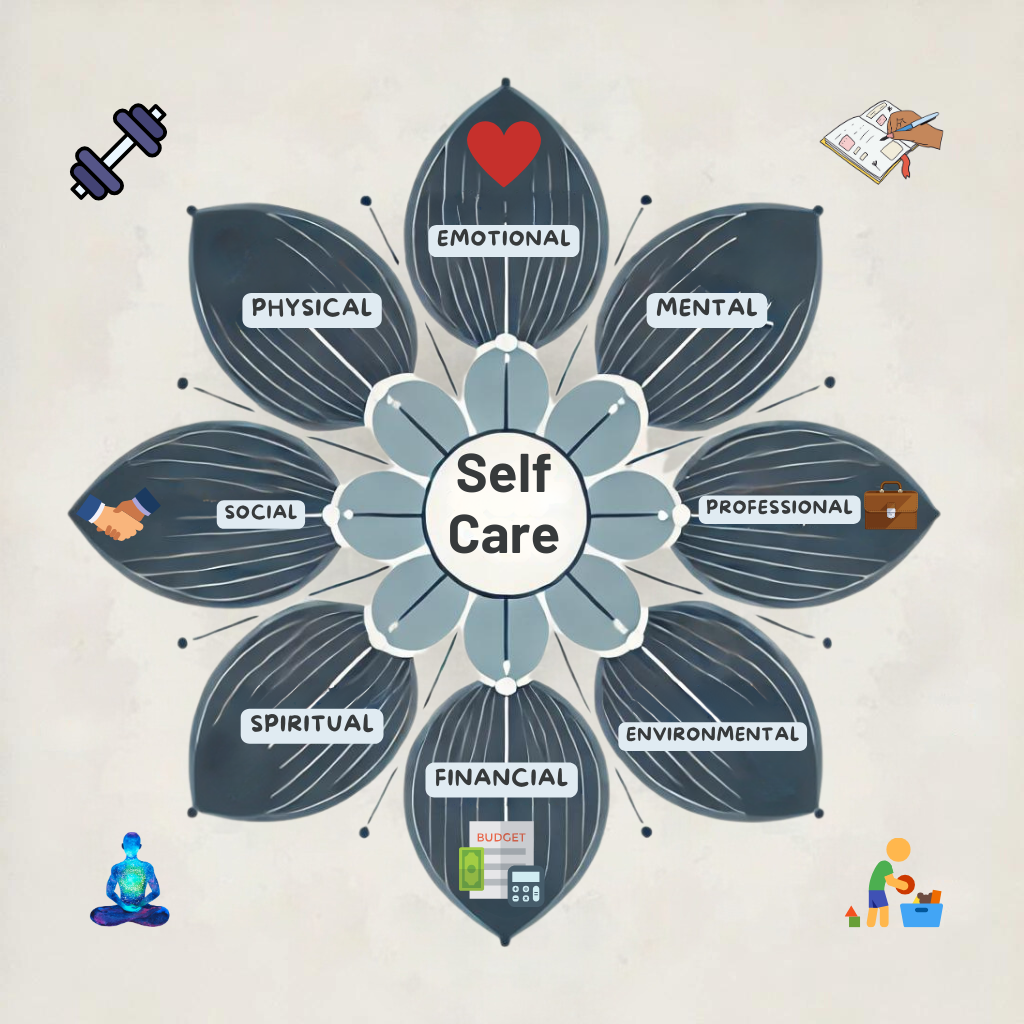The Path to Deep Health: Elevate Your Self-Care Routine
Jul 14, 2024
Why Self-Care Matters
Self-care isn't just about pampering yourself—it’s about sustaining your well-being to perform at your best in both your professional and personal life. In today’s fast-paced world, where burnout is all too common, self-care is essential for long-term success and happiness.
Understanding Self-Care
Self-care involves intentional actions to care for your physical, mental, and emotional health. It's not a one-time event but a continuous practice that helps you recharge and maintain balance. By prioritizing self-care, you can enhance productivity, creativity, and overall well-being.
The 8 Dimensions of Self-Care:
-
Physical – Exercise, nutrition, sleep
-
Emotional – Stress management, self-compassion
-
Mental – Learning, cognitive stimulation
-
Social – Relationships, community
-
Spiritual – Mindfulness, personal values
-
Professional – Work-life balance, career growth
-
Environmental – Creating a supportive space
-
Financial – Managing resources wisely

The Impact of Self-Care in the Workplace
Neglecting self-care can lead to stress, burnout, and decreased productivity. A consistent self-care routine can improve focus, energy levels, and job satisfaction. Key workplace self-care strategies include:
-
Physical Health: Regular exercise, adequate sleep, and healthy eating to maintain energy and focus throughout the workday. Even short breaks to stretch or walk can make a significant difference.
-
Mental Health: Managing stress through mindfulness practices, such as meditation or deep-breathing exercises, helps maintain mental clarity and reduce anxiety. Setting realistic goals and taking regular breaks can also prevent overwhelm.
-
Emotional Health: Building a supportive work environment and maintaining healthy work relationships contribute to emotional well-being. Seek support from colleagues, mentors, or healthcare professionals when needed.
Integrating Self-Care into Daily Life
Self-care should extend beyond the workplace. Here’s how you can integrate it into your daily life:
1. Create a Routine
Establish a daily routine that includes time for physical activity, relaxation, and hobbies. Consistency is key to making self-care a habit.
2. Set Boundaries
Learn to say no and protect your personal time. This prevents burnout and ensures you have time for activities that rejuvenate you.
3. Practice Mindfulness
Incorporate mindfulness practices into your daily life, such as meditation, journaling, or practicing gratitude.
4. Nurture Relationships
Spend quality time with family and friends. Social connections are vital for emotional support and provide a sense of belonging and community.
The Path to Deep Health: A Holistic Approach
Self-Assessment
Reflect on your physical, mental, and emotional health. Use self-assessment questionnaires or journaling to track your well-being.
Define Your Goals
Identify key areas for improvement—physical health, mental clarity, emotional balance, spiritual growth, and social connections. Create a vision board to visualize your self-care journey.
Plan Your Routine
Develop a daily and weekly schedule that includes physical activity, mindfulness, and social interactions. Identify activities that bring you joy and peace.
Take Action
Begin with manageable steps, such as a 10-minute daily meditation or a short walk. Track your progress using apps or journals.
Reflect and Adjust
Regularly review your progress and adjust your routine as needed. Recognize and reward yourself for milestones.
Maximizing Benefits and Tracking Tools
Leveraging Insurance and Workplace Benefits
If possible, take advantage of your insurance plan for wellness services like:
-
Massage therapy
-
Chiropractic and osteopathy
-
Physiotherapy and nutrition counseling
If your company offers a health and wellness spending account, use it for gym memberships, coaching sessions, or fitness classes.
Utilizing Health Trackers
Consider using tools like Oura, WHOOP, Fitbit, or Apple Watch to monitor:
-
Physical activity
-
Sleep patterns
-
Heart rate variability
These insights can help optimize your self-care routine and improve long-term well-being.
Final Thoughts
Self-care is not a luxury but a necessity. By prioritizing your physical, mental, and emotional health, you can enhance your performance and overall well-being in all areas of life.
Remember, self-care is a journey, not a destination. Start small, be consistent, and observe the positive changes it brings to your life.

